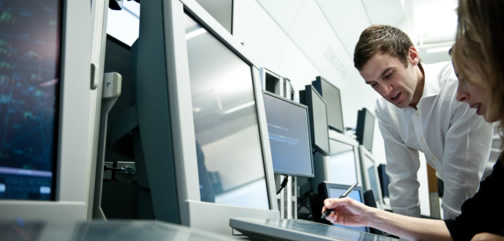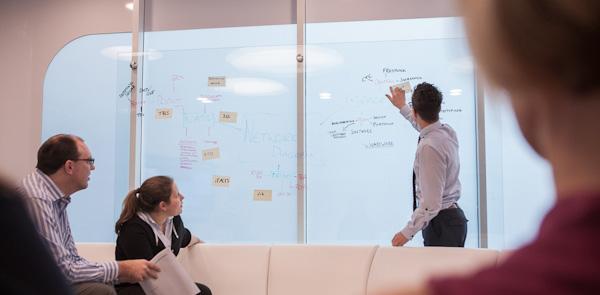Careers conundrum? Learning your options for placements, apprenticeships and graduate schemes
18 September 2015It’s a new term and students everywhere are returning to, or starting, university or college, taking the first steps on their career ladder.
For students planning placement years, organising apprenticeships or looking for work as graduates there are lots of options out there.
We have various schemes for you to browse on our Early Careers webpage. And we’re delighted that NATS has moved up 10 places in RateMyPlacement’s Top 100 Undergraduate Employers table.
It is competitive; we look for various qualities relating to the particular placement we are offering, and are impressed by those who have prepared for interview and are studying a topic related to the particular placement. It’s always good to hear if someone has an interest in aviation, though It’s not essential for every placement.
Each year around 1,000 people apply for one of our Direct Entry Graduate (DEG), Apprenticeship or Industrial Placement positions, and around 28 are successful. A selection of those go on to careers at NATS.
So we thought we’d ask one of our former placement students, now working full time with us, why he chose our Industrial Placement and Direct Entry Graduate (DEG) schemes and how they have helped shape the start to his career in engineering.
Sean Oliver
Asset Support Engineer
I have been a full time employee at NATS for a year having successfully completed the DEG scheme last September. NATS’ expectation is that all successful graduates then continue and progress their careers making the next competency grade within two years, which I hope to achieve.
 My industrial placement at NATS was between my third and fourth undergraduate years at university, followed by one year as a post-graduate student. (NATS also recruits students on a two-year post-graduate scheme.)
My industrial placement at NATS was between my third and fourth undergraduate years at university, followed by one year as a post-graduate student. (NATS also recruits students on a two-year post-graduate scheme.)
I studied Systems Engineering at the University of Warwick and had no previous knowledge of NATS or any particular interest in the aviation industry. When I met NATS representatives at a careers fair, they explained how my enthusiasm in engineering could be applied in the aviation industry. I was unaware that NATS has many different kinds of engineering technologies to deliver its Air Traffic Management services; voice, data communications, radar, data processing and simulators are just a few examples.
At university I learnt coding, mathematics and other academic aspects. During my placement year I successfully coordinated this understanding with colleagues’ expertise in the key technologies to produce the desired outcomes for our customers. I quickly learnt lots of new information, which is rewarding for someone who embraces continuous learning.
I took this experience of managing technical projects and coordinating engineering activities back to university, which stood me in great shape for group projects during my final year. When I graduated and went on to the DEG scheme I did two further work placements; one involved improving our system control function, which provides our front line of systems support; the other was working on voice communication systems, specifically on the performance of aerials and radio signal transmission coverage.
My work on voice communication systems was really enjoyable and engaging, particularly investigating the differences between actual transmitted radio coverage and what is produced by simulation tools. Both the placement year and the DEG scheme gave me the chance to apply the skills and experience from my degree, and see the tangible benefits that NATS delivers to the general public.
Now as a full time employee, I work on projects to investigate problems and find solutions to ensure our systems are capable of meeting the high demands of a safety critical environment. In my current role as Asset Support Engineer, I support the Asset Design Authority working on various projects and systems, including our Arrival Management System (AMAN) and Time Based Separation (TBS). AMAN and TBS have enabled us to tactically alter flight approach and arrivals saving fuel for airlines and increasing capacity for participating airports.
Now when I arrive at an airport I annoy all my friends and family with explanations of what is happening, how everything works and what it all means.
Comments
Please respect our commenting policy and guidelines when posting on this website.


